Just added to your cart

Tips for Creating Summer Reading Assessment Ideas (Plus 3 Fun Ideas!)
Many teachers assign summer reading. However, summer reading can be difficult for students who lack time management skills, motivation, or even the literacy skills necessary to complete the work.
For this reason, summer reading assessment can also be challenging, as students can disengage from the material and Google answers to questions or read summaries instead of reading the book.
Despite its challenges, summer reading assignments can still have value in the English Language Arts classroom. We need to look at how we assess summer reading -- making reading enjoyable rather than a drag for everyone.
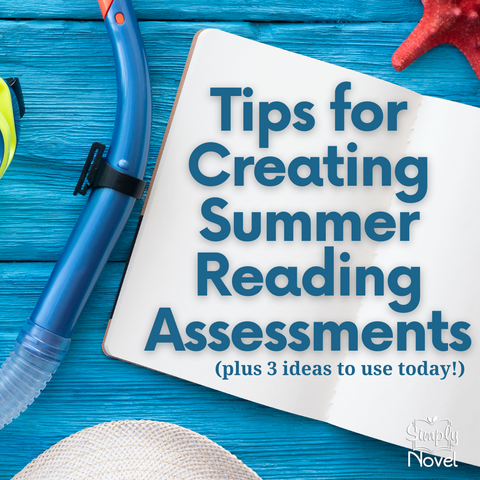
Here's how to get the most out of your summer reading assignments:
What is a summer reading assessment?
I like to look at assessments as three prongs of the same concept: Accountability Assessments, Critical Thinking Assessments, and Creative Assessments. Each one is slightly different from the other, but all equally valuable assessment tools. The three prongs overlap more often than not.
Each one has value, and they work better when you vary the types of assessments you use, and you do not rely on just one type too much. Each type of assessment requires students to think on different levels of Bloom’s Taxonomy.
What are the three types of Reading Assessments?
Accountability Assessments
These are traditional tests and assignments that aim to keep students accountable to complete the reading. Think: study guides, reading guides, and end-of-the-novel tests and quizzes. These are not to be confused with state or district-level standardized testing.
Critical Thinking Assessments
These are higher-level critical thinking assignments that encourage students to analyze, synthesize, and evaluate the summer reading. There are a variety of ways to format this type of assessment. Think: small group discussions such as a Socratic Seminar, or a literary analysis paragraph writing where students identify and analyze the purpose and effectiveness of an author’s use of figurative language and other literary elements.
Creative Assessments
These are projects and other assignments that require accountability and critical thinking, but also include creativity and fun. Think of posters, interpretive projects, video creation, podcast creation, etc.
Creative Reading Assessments
Creative Assessments are by far the most engaging and valuable to address the unique challenges of summer reading. Innovative summer reading assessments can make all the difference for kids who may not have otherwise completed the task. Having relevant, engaging, and interesting assessments will not only increase the chances that students will do the summer reading, but it will also be a great introduction to your class in the fall!
Below are some ideas for creative reading assessments for your summer reading assignments.
Snap Chat Conversation
Snapchat has been around for a while, and the way teens use it, it doesn’t seem to be going away anytime soon. Why not capitalize on that? (Kids can still keep their streaks going, too!) For this project, have students create a series of snaps that show characters interacting with each other. They can save these snaps as images, upload them to Google Slides or PowerPoint and either just turn them in, or present them. Better yet, have that student select a partner to read out loud the snaps!
Character Awards
To freshen up your summer reading assignment, try having students create unique and interesting awards for the characters. This is a good way for students to recall information and analyze character development at the same time. Ask students to come up with the award and the reason why that character earned it. For example, Boo Radley could receive the award for “Hero Least Likely to Need Sunscreen” for his valiant rescue of the Finch children after years of reclusive behavior that goes back to his childhood. To make it more fun and engaging, another student could come up to receive the award, in character, and give an acceptance speech with references from the text.
Character Letters of Recommendation
Students, especially juniors and seniors, are familiar with the art of asking and receiving a letter of recommendation. But they haven’t had the experience of writing one! With this type of assessment, students can get into the counselor/teacher character and write a letter praising, thinly sugarcoating, or even criticizing a character from the reading. Clear references to the text should be used to support your reasoning for recommending, or even not recommending, a character.
These are just three different ideas to assess your summer reading assignments for middle or high school in a creative way. What creative ways do you use to assess summer reading? We'd love to hear!
- Share Share on Facebook
- Tweet Tweet on Twitter
- Pin it Pin on Pinterest
Leave a comment
Please note, comments must be approved before they are published
- choosing a selection results in a full page refresh
- press the space key then arrow keys to make a selection
- Admitted Students
Summer Reading Assignment
Wvu's campus read.
Transcendent Kingdom by Yaa Gyasi has been selected as the 2023-24 WVU Campus Read . All students should read this fantastic book during the summer months.
The WVU Campus Read program is an academically-driven common read experience that engages students, faculty, staff, and even members of the Morgantown community, to share ideas and think critically through thoughtful dialogue.
As a first-year Honors student, we ask that you delve into the material a little deeper and reflect on the book before starting your classes this fall. The Campus Read examines deep, complex issues that may be triggering to some. If you feel the need, please reach out to counselors at the WVU Carruth Center at 304-293-4431 or [email protected] .
Life can seem unfair, chaotic and unsettling at times. Yaa Gyasi shares a story about generational trauma, financial struggle, familial dysfunction, drug addiction, mental illness, immigration, religion and the complex emotions that go along with those experiences. Throughout the novel, the central character, Gifty, remains curious about her experiences, and ultimately, her curiosity about addiction becomes her life’s work. Here at the Honors College, we encourage you to lean into your curiosity, too. How will you make meaning of your own life experiences?
The Honors experience is about becoming more of who you really are. We support you during your time in the Honors College and encourage you to uncover, discover and develop the real you.
Through the Honors College Summer Reading Assignment, we encourage you to think critically, consider all options to make the best possible decisions, and work toward becoming the best version of yourself. Active reflection, after all, is a huge piece of what college is all about, and what makes the college experience something that is invaluable and life changing.
The Honors College has developed four prompts for you based on the reading.
Your Assignment
The Honors College has developed four prompts for you based on the reading. Please choose one prompt .
For prompts 1-3, write an essay that is:
- 1200-1500 words,
- double-spaced,
- 12-point font size,
- Times New Roman,
- one-inch margins and
- APA or MLA format.
Gifty’s brother died from an overdose, which greatly affects both Gifty and her mother. Gifty even decides to study neuroscience and addiction partly because of what happened to her brother and the effect it had on her mother.
Gifty recalls, “I loved God, my brother, and my mother, in that order. When I lost my brother, poof went the other two. God was gone in an instant, but my mother became a mirage, an image formed by refracted light.” (p. 280)
Has there been an event in your life that affected you similarly or changed the course of your life?
A common theme in the book was Gifty’s struggle to separate the beliefs she grew up with versus what she believes now.
Gifty states, “I used to see the world through a God lens, and when that lens clouded, I turned to science. Both became, for me, valuable ways of seeing, but ultimately both have failed to fully satisfy in their aim: to make clear, to make meaning.” (p. 213)
Is there anything you believed when you were younger that you don’t believe in anymore or you simply aren’t sure about, like Gifty’s struggle with religion? Is there anything you didn’t believe that you believe now? Please relate your response to quotes or experiences that happened in Transcendent Kingdom .
Much of Gifty’s story is about trying to make meaning of what happened to and around her. She uses her talent as a scientist to understand addiction, which, in turn, gives her a sense of purpose. This outcome, however, does not come without challenges. Gifty talks about one particular class during college that she struggled with and gratefully accepted a B- in the course. As a humanities requirement for her degree, she took a creative writing class, something that was out of her comfort zone. (Chapter 19)
As a college student, you may need to step outside your comfort zone, as well.
How will you use your Top 5 Gallup strengths to overcome obstacles and challenges you may face? How will you utilize your Top 5 Gallup strengths to fulfill your purpose? Share your purpose and how it may align with Gifty’s quest to make meaning of her life experiences.
One of Gifty’s favorite teachers tells the protagonist:
"The truth is we don't know what we don't know. We don't even know the questions we need to ask in order to find out, but when we learn one tiny little thing, a dim light comes on in a dark hallway, and suddenly a new question appears. We spend decades, centuries, millennia, trying to answer that one question so that another dim light will come on. That's science, but that's also everything else, isn't it? Try. Experiment. Ask a ton of questions."
Create either a TikTok-like video (does not have to be on the TikTok platform) or a digital narrative using Adobe Spark Page to discuss this quote and its relation to critical thought and learning, the scientific method or the Dunning-Kruger effect .
Explain how this quote will influence your time in college.
The video or digital narrative must include:
- A thesis statement.
- At least 7 photographs with 3-5 sentences of narrative for each photo that support the thesis. Students are welcome to use pictures of themselves, their lives, their books, their family, or whatever photographs they feel relates to the quote (Digital Narrative)
- At least 45 seconds of information that supports your thesis in a cohesive narrative (Video)
- An explanation of what the quote has to do with the novel
- An explanation of how the quote will influence your time in college
- An explanation of what the quote has to do with critical thought and narrative, the scientific method or the Dunning-Kruger effect (Choose One)
- Music, pictures, narrative and videos that creatively illustrate your main thesis
- Interior Chinatown (TikTok)
- Elements of Design and Interior Architecture in Guatemala (Digital Narrative)
- Public Art in Guatemala (Digital Narrative)
- A Woven History of the Art of Textiles and Womanhood in Guatemala (Digital Narrative)
- Mountaineer Roasting Company Coffee Bean Supply Chain (Digital Narrative)
- Lake Atitlan in Guatemala (Digital Narrative)
The assignment will be graded out of a total of up to 100 points. The assignment rubric is available below.
Prompts 1-3
Campus Read Prompt Discussions
Join us for one of our optional Campus Read Prompt Discussions later this August. Email invitations to register for the discussions will be sent closer to each date.
- Sunday, August 6, 2023, from 7-8 p.m. on Zoom
- Monday, August 7, 2023, from 7-8 p.m. on Zoom
- Tuesday, August 8, 2023, from 7-8 p.m. on Zoom
- Wednesday, August 9, 2023, from 7-8 p.m. on Zoom
For questions about the summer reading assignment, please email Dr. Ashley Watts .
Much Ado About Teaching
Summer reading in ap lit..

A few years ago I revamped my summer reading assignment.
It marked an important departure for me. It was a significant step in my growth as a teacher. I’ll explain why, but first I want to share what I have done in years past.
THE OLD SUMMER READING ASSIGNMENT
My summer assignment has gone through different iterations over the years, but the gist of it has always been that the students had to read two books — How to Read Literature Like a Professor: A Lively and Entertaining Guide to Reading Between the Lines and 1984 — and develop an outline for each. There are many versions of this assignment online. Its probably where I first developed the idea. I must have Googled “ How to Read Literature Like a Professor summer assignment.” A bunch of results came up, and seeing that a lot of other teachers paired Thomas C. Foster’s work with another novel probably validated its worth in my mind.
I liked that both books were accessible and my students could find help online if they needed it.
I liked that I was introducing my students to good literature without ruining their summer with dense texts and mountains of work.
I liked that when students returned from school I could assess them by asking them to apply a chapter from How to Read Literature Like a Professor to 1984 .
I liked that I was doing something to prevent the summer slide.
THE PROBLEM WITH THE OLD ASSIGNMENT
There was nothing pedagogically wrong with my old summer reading assignment. But there were certain things about it that had bothered me over the years:
- Students can easily find summaries of How to Read Literature Like a Professor online ( like this link) .
- Many of my students are not readers of classic literature on their own. In spite of its cheeky humor and tone, they did not have the awareness of texts mentioned in How to Read Literature to fully appreciate the references.
- Students felt that How to Read Literature Like a Professor simplified the process of reading, reducing everything to either a symbol or an allusion.
- The assignment was not thoroughly thought through. It was too simplistic. Basically I was asking students to read and outline. I felt like I was simply following what others were doing without making this assignment a true reflection of my teaching and my goals.
- There wasn’t much feedback I could provide on an outline and consequently little room for growth.
THE GOALS OF SUMMER ASSIGNMENTS
I believe that when students are faced with low-rigor tasks, they create low achievement even when students do well on these tasks. In addition, such tasks contribute to the boredom students so often complain about when they spend too many hours on work that is routine and bland, often centered on discrete skills.
Outlining a text is a low-rigor task. It requires little skill beside extrapolation and summarization.
I want my summer assignments to have what I believe are the three principles of an effective assignment:
1. Effective assignments provide clear expectations about what should be completed, how it should be completed, and why the assignment is important.
I needed to rethink the final part of that criteria. While the original assignment provided clear expectations and walked students through the steps to be completed, it never explained why the assignment was important. When there is no value attached to an assignment, the work can feel like busy work.
Assignment-making requires teachers to clarify what learning is demonstrated and how it can be demonstrated. I needed to answer questions about purpose and relevance: “Why are my students doing this? What greater good will result from this work? As well as, are there significant concepts connected to the curriculum?”
2. Effective assignments are formative, providing feedback that allows teachers to adjust their instruction and scaffold learning.
I also needed to understand how my teaching can be informed by what the students completed. This is where the outlines of the prior assignment failed to be valuable. I was learning nothing about my students nor anything about their thinking.
With the new summer assignment adjustments would I make based on the work that students produced? What was I learning about their reading skills or their writing skills?
Good assignments, whether in the summer or during the school year, should inform instruction, giving teachers a chance to assess skills and modify instruction accordingly.
3. Effective assignments set high expectations and provide pathways to achieve those expectations.
I want the new assignment to communicate high expectations for critical thinking and levels of analysis. I want my students to be challenged no matter what skill sets or content background they bring into the course.
WHAT MY STUDENTS ARE DOING INSTEAD
- I want my students to have a summer experience that is not punitive but is preparatory. I don’t want to punish them with mountains of work or use a summer assignment as a gatekeeper for the class. I want to set a foundation for the enjoyment that comes from reading, thinking, and writing creatively and analytically.
- I want my students to see that great ideas can be expressed in a variety of formats. Therefore, they will read blog articles, watch YouTube videos, and read poems as well as a novel.
- I want them to learn from readers, writers, and thinkers that I admire. I’m not just handing them books and asking them to read them, I want them to observe how others analyze and how others approach the act of writing. These pieces have the levels of analysis that will promote high expectations for my students.
- I want them to choose the novel they read, not have one assigned to them.
- I want them to have a space of their own creation (their StudyTee Notes) where they will respond to each text that they encounter in thoughtful and diverse ways.
THE SUMMER READING TEXTS
- StudyTee’s Note-Taking Method
- The NerdWriter Analyzes Edward Hopper’s “Nighthawks”
- Leo Babauta’s Why I Read (+ a Dozen Book Recommendations)
- Any novel on this list or this one
- Poetry Foundation’s Poem of the Day
Download the Summer Reading Assignments for Susan Barber and Brian Sztabnik
Concluding thoughts.
I know that I am asking my students to complete somewhat unorthodox summer assignments. They are not being handed a textbook or a stack of novels and asked to complete a series of study guide questions or outlines. There comes a point in a teacher’s career when he or she stops doing things just because everyone else is doing them and strikes out on his or her own path.
And this has been that moment for me.
Instead, I am giving them models of critical thinkers. I am exposing them to a variety of texts across a span of genres. I am giving them the power to choose the novel and poems that they want to read. And it will have clear expectations, an understanding of why each component of the assignment is important, a chance for me to gain formative feedback, and high expectations for success.
Brian Sztabnik is just a man trying to do good in and out of the classroom. He was a 2018 finalist for NY Teacher of the Year, a former College Board advisor for AP Lit, and an award-winning basketball coach.

End of Year Activities

It Was the Best of Times, It Was the Worst of Times
You may also like.

The Secret to Close-Reading Success

Teaching Sonnets and Disrupting Sonnets

Teaching the Whole Class Novel
Please go to the Instagram Feed settings page to create a feed.

Copyright © 2024 DAHZ All Rights Reserved. Much Ado About Teaching.

Summer Reading 2023
High five! You made it to summer! Tech's English Department hopes that July and August offer you some rest and relaxation, some time to invest in the people and activities you love. We also hope you find a book to enjoy. For this summer assignment, choose any work of fiction or non-fiction that interests and challenges you. You can see our suggestions on the next page, but the choice is up to you.
What do I do over the summer?
- Select a book that you haven't read before from our suggested list or find one on your own. You can check many of these books out digitally from our school library using the Sora app or from a public library. Be thoughtful about your selection. Choose something of personal interest and something that will push you as a reader and thinker. You are free to read from any grade level or even something that isn't on our list.
- Choose one of the options below:
- Option 1: Write a personal response to your chosen book. What did you find relatable / compelling / infuriating / thought-provoking / problematic and why? How do the issues and themes this book raises relate to your life? Dig into some specific ideas and moments that got you thinking. (350-500 words)
- Option 2: Create a piece of visual art that explores an important idea from the book you read. The piece should delve into your response to the book, not just provide an illustration. It may be any size or medium, but it must be your original artwork. Include a caption that explains your intentions and choices. (~150 words)
- Option 3: Compose a letter to the author of your chosen book OR a letter to a character in it. In your letter, bring up the ideas and questions that the book raised for you. Consider offering your personal reactions to specific moments in the book. Write like it's a conversation, not an essay. (350-500 words)
- Two additional guidelines to consider:
- The spirit of this assignment is to encourage curiosity and thoughtfulness about books and the world. Be original, be creative, have fun! Please, please, please don't be boring. We are interested in your opinions, reactions, and responses to the book. No summaries please; we can read those online too.
- Save your work digitally so that you can easily upload your writing/artwork to Google Classroom in the fall by Friday, September 15th .
Come to class in the fall ready to talk to your new classmates and teacher about your book and share your writing/artwork. Your English teacher will provide more details in the first week of school, but plan to submit your work on Google Classroom by Friday, September 15th . EVERY SINGLE TECH STUDENT IS EXPECTED TO COMPLETE A SUMMER READING ASSIGNMENT!
For Rising Seniors, Class of 2024: In addition to the summer reading, all seniors are expected to have a complete draft of an essay that responds to one of the Common Application essay prompts . You may revisit the work you did with your 11th grade English teacher this past spring or start over with a new idea based on what you learned. This essay is also due Friday, September 15th . You will spend some time in the early fall revising this piece.
Alternate Assignments: Please note that students who are taking the following classes next year have a different summer assignment that they should complete in lieu of this one: AP Capstone Seminar, AP Capstone Research, and AP English Literature . Those assignments are posted below. Also note that juniors taking AP English Language must choose from the list of 11th grade non-fiction options.
What's that you say? You want to read MORE!?
Please join us for the BTHS Summer Reading Challenge Bingo ! Read three books in different categories and win Tech merch! Students, staff, parents and alumni are all invited to participate.
- 10th Grade AP Capstone Seminar - Complete the alternate assignment below called "Summer Reading 2023 AP Capstone Seminar."
- 11th Grade AP English Language & Composition - You MUST choose from the list of suggested 11th grade NON-FICTION works in the general assignment.
- 12th Grade AP English Literature - Complete the alternate assignment below called "Summer Reading 2023 AP English Literature."
- 12th Grade AP Capstone Research - Complete the alternate assignment below called "Summer Log 2023 AP Capstone Research."
- Falmouth High School
- Lawrence School
- Morse Pond School
- East Falmouth School
- Mullen-Hall School
- North Falmouth School
- Teaticket School

- Falmouth Public Schools
A Community Committed to Excellence: Every Student. Every Day.
English Language Arts
Page navigation.
- Literacy Assessments
- Kindergarten
- Elementary (Grades 1-4)
- Morse Pond (Grades 5 & 6)
- Lawrence (Grades 7 & 8)
- Falmouth High School (Grades 9-12)
- Grade 5 and 6 Summer Reading Expectations and Suggestions
- Grade 7 Summer Reading List
- Grade 8 Summer Reading List
- Grade 9 Summer Reading List
- Grade 10 Summer Reading List
- Grade 11 Summer Reading List
- Grade 12 Summer Reading List
FHS Summer Reading Journal Prompts
- Summer Reading Lists
FHS Summer Reading: Keeping a Journal
To help yourself successfully complete this year's summer reading assignment, you may want to keep a journal as you read. In this journal, you can record your reactions to the reading by using the questions on the back of this sheet as your prompts. The journal will help you in several significant ways:
- Your journal will serve as a good basis for review when your teacher asks you to complete an assessment during the first full week of school in September.
- English teachers use the summer reading assignment as the basis for a grade worth 5-10% of your quarter one average.
- Your teacher may ask you to make some kind of presentation separate from the in-class essay. The journal can be used in place of or as part of this assignment.
- You can improve your critical and close reading through journal responses.
- Students entering honors classes may be required to turn in journals during the first full week of school. Students entering CP classes may be able to turn in journals for extra credit. See the Summer Reading List for your grade level for more information.
- Use the prompts below as the bases for your journal entries. You must respond to at least five of the prompts for credit.
- Do not summarize the book. Summaries will not be accepted for credit.
SUMMER READING JOURNAL PROMPTS
- Date each entry.
- Fully develop with examples and explanations of the examples.
- Respond to at least five different prompts.
- Each response must include textual evidence cited with the page number.
- Each response will require a minimum of 2-3 paragraphs.
- How are the characters developing? Do you dislike certain characters? Are some characters dynamic? Are some flat? Do the characters change over the course of the story? How are the events or other characters influencing or motivating the characters?
- Are there recurring themes, ideas, images, and symbols? Why do you think the author is repeating them? What do you think of the author’s decision to repeat them?
- What are the conflicts in the book? Why are these conflicts developing? Are these conflicts internal (within the characters) or external (from outside sources)?
- Can you relate to any of the characters? Do parts of the book remind you of yourself or others? Why? Can you feel what any of the characters are feeling?
- Who is the narrator of the book? From what point of view is the story told? Why do you think the author selected this perspective and what effect does it have? Would a different narrator or different narration improve the book?
- Write a letter to one of the characters. Include three specific events of which the character was a part. Comment on the character's response to events or offer advice. Ask questions.
- Evaluate the writing style of the author. What are the sentences, word choice, descriptions like? Does the style help the story line? Could the style be improved? How
- What is the author's tone towards his or her subject? What two words best define the tone of this book? What scenes, episodes, or examples are good examples of the author's tone?
- What is the mood created in the reader by this book? What examples best reveal the mood of this book?
- If you could be one of the characters for one day, who would you be and why? Who would you definitely not be and why. Explain your choices.
- What would you change in the story? How would you improve it?
- Select a passage and annotate it for literary elements including theme. Then after you annotate it, explain why you chose this selection over others.
Rubric
4- Responses are specific and richly developed; each refers to strong examples from the text; response provides documentation (page number) 3- Responses are fully developed; each refers to appropriate examples from the text; response provides documentation (page number) 2- Responses are partially developed; each cites an example from the text, but the example may not connect completely to the question; provides documentation 1- Responses lack specific examples from the text; responses are general; no documentation 0- Shows little or no evidence that the student read the text thoughtfully OR student did not respond to the prompts
- Questions or Feedback? |
- Web Community Manager Privacy Policy (Updated) |
- Estelle V. Malberg Early Childhood Center
- Clara Barton Elementary
- James F. Cooper Elementary
- Bret Harte Elementary
- James Johnson Elementary
- Joyce Kilmer Elementary
- Kingston Elementary School
- A. Russell Knight Elementary
- Horace Mann Elementary
- Thomas Paine Elementary
- Joseph D Sharp Elementary
- Richard Stockton Elementary
- Woodcrest Elementary
- Henry C. Beck Middle School
- John A. Carusi Middle School
- Rosa International Middle School
- Cherry Hill Alternative High School
- Cherry Hill High School West
- Cherry Hill High School East
- WE Graduate 2021

- Cherry Hill Public Schools
Dedicated To Excellence In Education
Summer Reading
Page navigation.
- Book Access
Summer Reading 2023
Note to parents.
One of our district’s primary goals is to develop lifelong readers and learners. Summer reading is an opportunity for students to practice the comprehension, analytical, and note-taking skills learned throughout the year while reading a thought-provoking and enjoyable book. For this reason, we like to offer students a variety of books from which to select.
The assignments for each grade level are included on the following pages, as well as some resources and guides to help you and your child.
Thank you for encouraging your child’s reading. We look forward to building on the foundation you have helped establish during the summer.
Access the 2023 Summer Reading Program Site
Visit the Cherry Hill Public Library for more summer reading events and opportunities.
- Learn about the Teen Summer Reading Program !
- Questions or Feedback? |
- Web Community Manager Privacy Policy (Updated) |
summer reading assignemnt
All Formats
Resource types, all resource types.
- Rating Count
- Price (Ascending)
- Price (Descending)
- Most Recent
Summer reading assignemnt
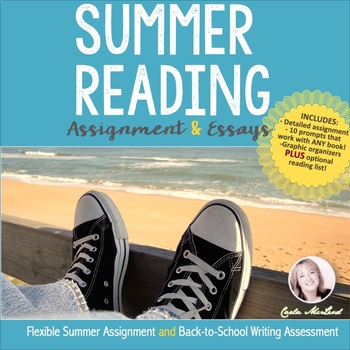

Summer Reading Program - Assignment , Essay Prompts & Optional Reading Lists

AP Lit Summer Reading Assignment

Summer Reading Assignment
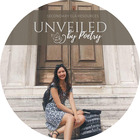
Summer Reading Assignment for High School English (Especially AP and Honors)

- Word Document File
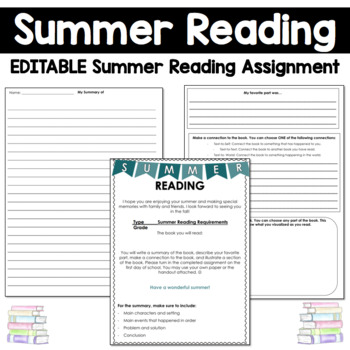
Summer Reading Assignment EDITABLE
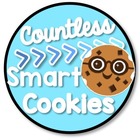
Immortal Life of Henrietta Lacks - SUMMER READING assignment

- Google Docs™
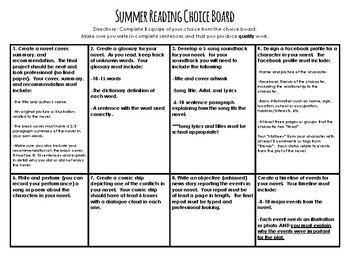
Summer Reading Choice Board Assignment and Rubric
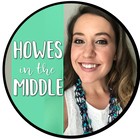
The Hunger Games Summer Reading Assignment Discussion Questions and Project

- Google Apps™
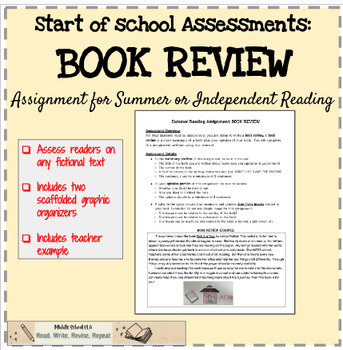
Start of School - Summer Reading : Book Review Assignment (for any fiction text)
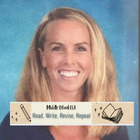
Wonder by R.J. Palacio Summer Reading Assignment Questions and a Project
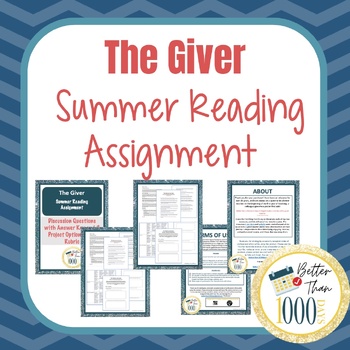
The Giver by Lois Lowry Summer Reading Assignment Questions and Project
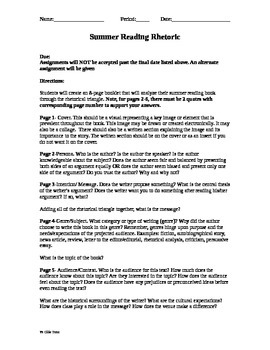
Summer Reading Novel Assignment FOR ANY NOVEL
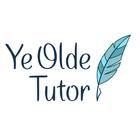
Summer Reading Assignment to use with ANY NOVEL

Lower Elementary Summer Reading Assignment Montessori w/Rubric

Best Books for 1st Grade - Independent Reading & Read Alouds - Summer Assignment
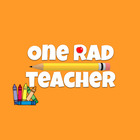
"The Pact" - Summer Reading Assignment

7th Grade Summer Reading Assignment /Worksheet to use with ANY NOVEL

Editable: English 11 Honors Summer Reading Assignment

Summer ELA/ Reading Assignment
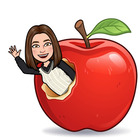
AP Summer Reading Assignment : BRAVE NEW WORLD and 1984

Summer Reading Assignment bundle with Essay Prompt
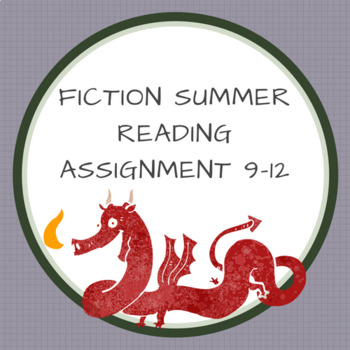
Fiction Summer Reading Assignment 9-12

- We're hiring
- Help & FAQ
- Privacy policy
- Student privacy
- Terms of service
- Tell us what you think
- Grades 6-12
- School Leaders
FREE Poetry Worksheet Bundle! Perfect for National Poetry Month.
Free Summer Reading Bundle for Use in the Classroom or at Home
Encourage kids to read all summer long with our reading log, goals worksheet, and bingo card!
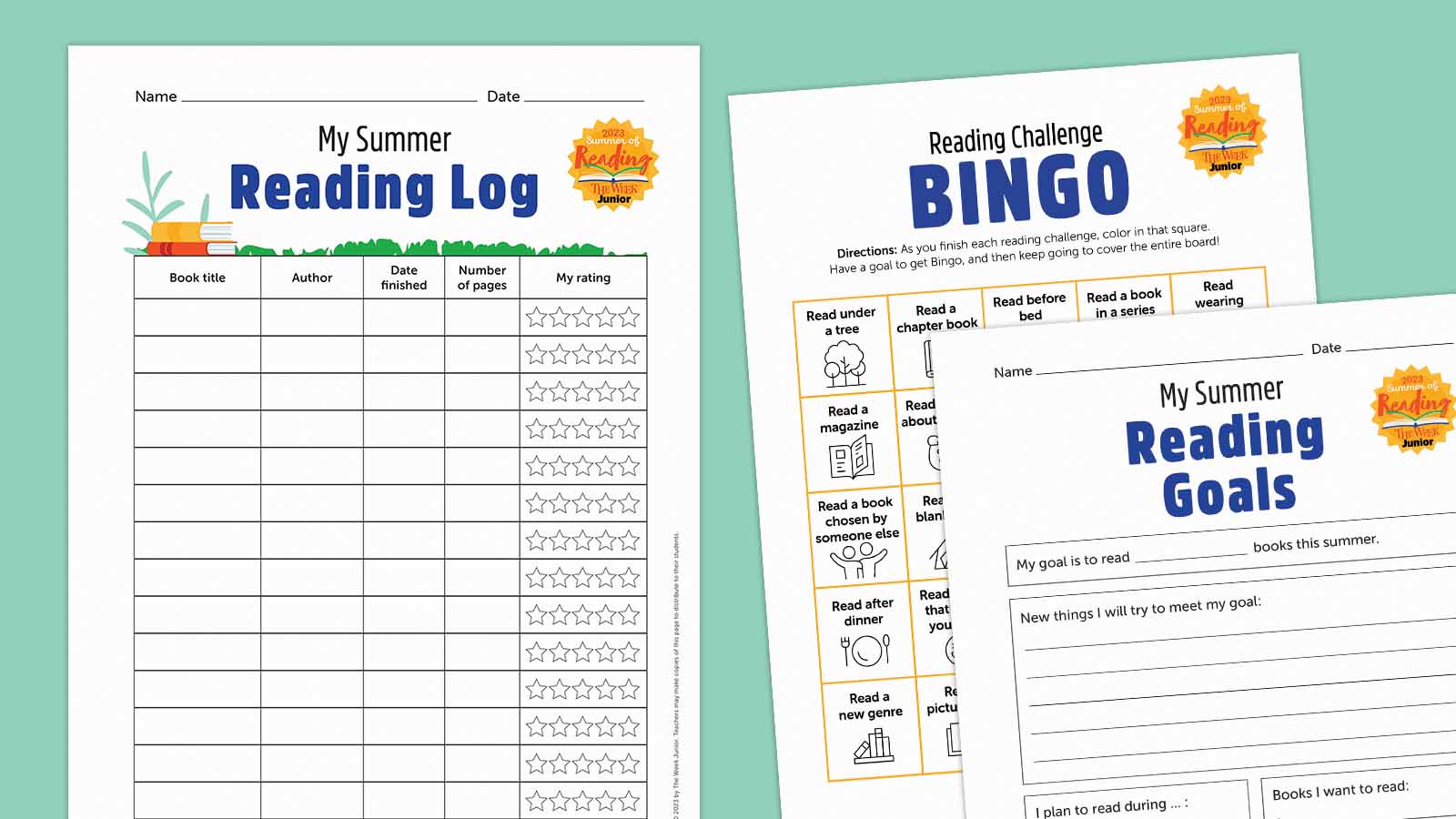
The Week Junior magazine is a kid-friendly, unbiased current events news source. It’s a safe and trusted partner to help you explain to kids what’s happening in the world while providing fun reading content including puzzles, recipes, crafts, and more.
Summer reading is one of the most valuable ways to help kids retain knowledge and build on their skills while not in the classroom. It helps create lifelong readers while improving vocabulary, literacy skills, reading stamina, and more. Together with The Week Junior , we’ve created a bundle that includes a summer reading log, bingo challenge, and goals worksheet that are great tools to keep kids reading both inside the classroom and at home.
Get Worksheets
It’s a great idea to diversify reading choices over the summer to keep kids engaged. The Week Junior is an awesome way to expose your readers to current events through a kid-friendly, unbiased magazine. There’s something for every kid, with sections on sports, culture, movies, crafts, recipes, and so much more! Get a free issue of The Week Junior , and watch kids dive into this interactive reading resource.
Check out what’s included in the summer reading log bundle:
Summer Reading Log Worksheet
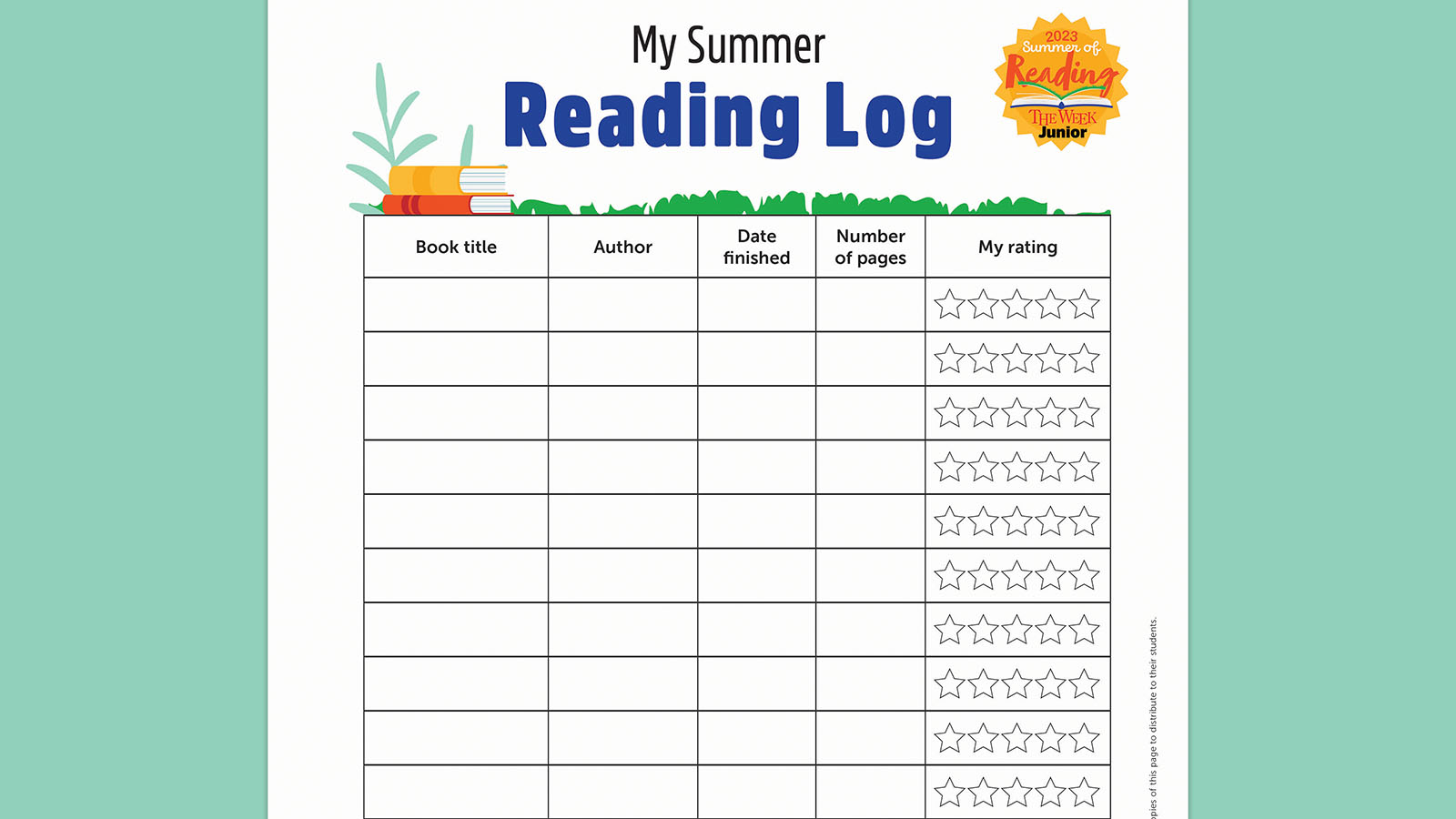
Bingo Challenge and Goals Worksheet
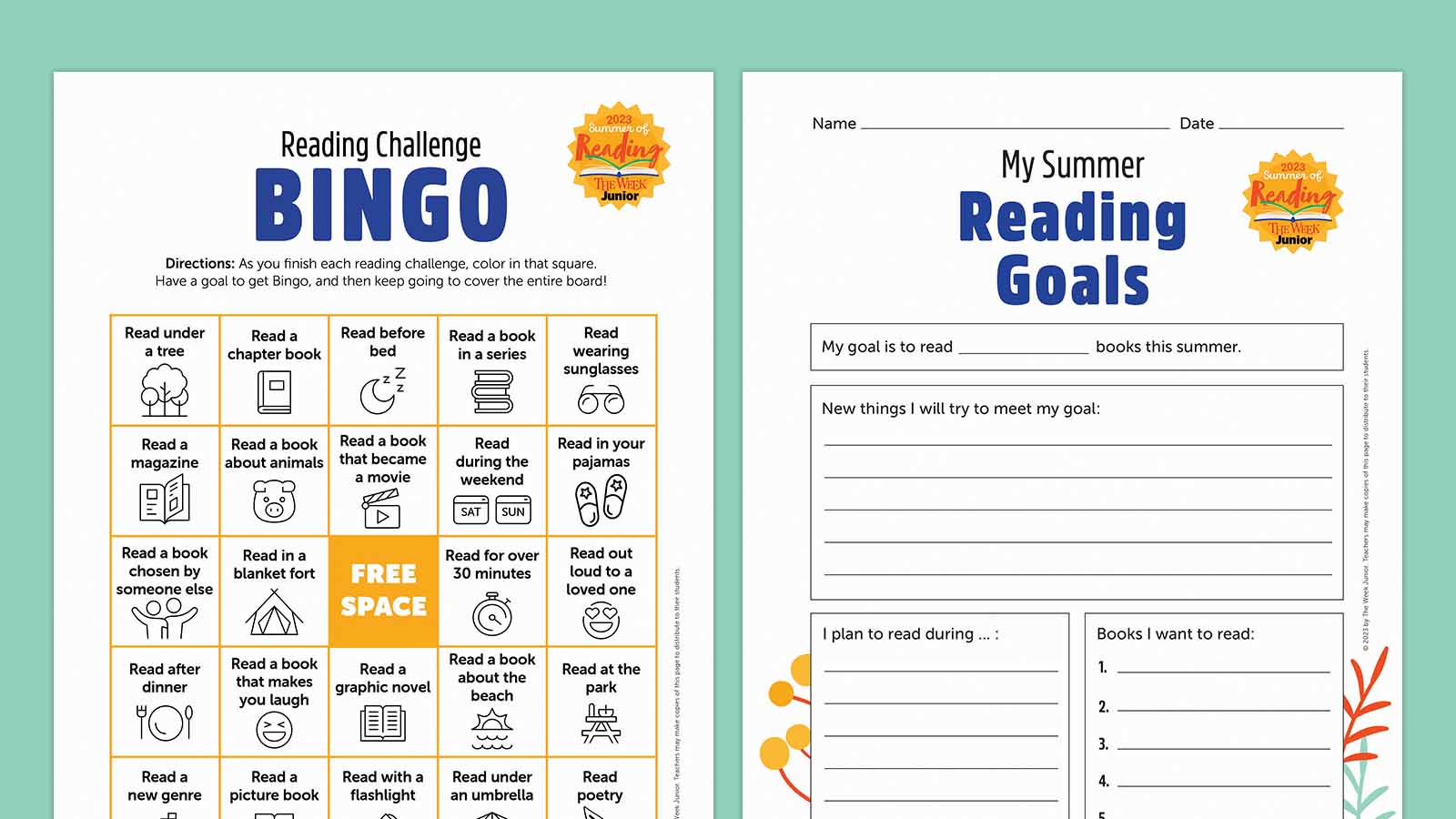
Classroom Use:
- Before the school year ends, have students begin their goals worksheet to set expectations for summer reading. Then, send them home with the rest of the bundle to help them keep track of their progress.
- Use the reading log in your classroom to keep track of weekly reading assignments. There’s even a version with a section for parent signatures!
- The bingo card and reading goals worksheets make for great classroom tools to encourage reading throughout the school year.
At-Home Use:
- At the start of the summer, encourage your child to fill out the reading goals worksheet and aim big!
- Document progress on the reading log, which is a great way to make a list of the awesome reading they’re diving into or keep track of required summer reading.
- The bingo card is an awesome way to keep kids excited about reading this summer and encourage them to try new things!
Looking for some awesome summer reading choices? Check out 50 books recommended by kids for kids from The Week Junior ! Plus, receive the brand-new reading list in this summer’s edition of The Week Junior by subscribing now.
You might also like.
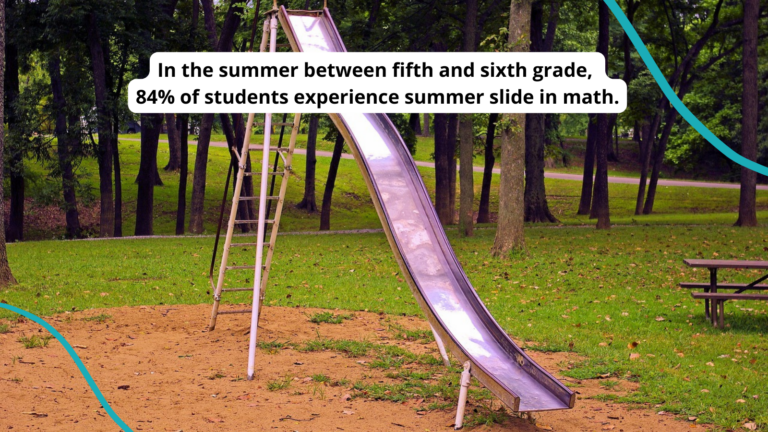
Is Summer Slide Real? (Plus Free Toolkit To Fight Summer Learning Loss)
Is it really as bad as they say? Continue Reading
Copyright © 2023. All rights reserved. 5335 Gate Parkway, Jacksonville, FL 32256
First Year Summer Reading Program

Your Westminster education begins even before you set foot on our beautiful campus, with this year’s summer reading — What the Eyes Don’t See by pediatrician and public health expert Dr. Mona Hanna-Attisha.
Because every first year student will read the same book, the summer reading assignment provides a common intellectual experience for you to share with your future classmates and professors. It will give you a sense of what college-level reading is like, and serve as the basis for classroom discussion and campus events this fall. Your experience with the book will set you on the road to a liberal arts education by challenging you intellectually and personally, and helping prepare you to make contributions in our rapidly changing world.
In What the Eyes Don’t See , Dr. Hanna-Attisha describes how economic decline, democratic exclusion, shortsighted policies, and indifference combined to create a public health crisis. She considers how easy it is to overlook grave threats when they don’t affect us directly. She shares insight about the ways her personal and family history contributed to her activism. And, she describes her role on the team of community volunteers, researchers and civil servants that blew the whistle on the dangers of Flint’s drinking water.
We hope you enjoy the book. As you read it, consider the questions it raises about the nature of poverty, exclusion and injustice, as well as the ability of individuals to make a difference and bring about positive change. If you’d like to know more about the situation since Flint’s water problem was exposed, you can read about some of the progress that has been made to improve Flint’s drinking water, as well as the challenges that remain, here: Flint Has Clean Water Now. Why Won’t People Drink It? - POLITICO .
- Flint residents’ voices tell story of water crisis in new work by UM playwright
- 5 Years After Flint's Crisis Began, Is The Water Safe?
Your job now is to read What the Eyes Don’t See and to write an essay in response to one of the three questions provided below. Follow the instructions for writing and submitting your summer essay that are provided there. Be sure to upload it to the drop box on the FY 000-01 First Year Summer Reading page on Desire2Learn by Monday, August 19th .

Source: Kmusser

Flint residents protest outside the Michigan State Capital in January 2016. Source: Wikimedia Commons

Corroded water pipes. Source: Min Tang and Kelsey Pieper
Below are the links to alternate formats for the summer reading book What the Eyes Don't See: A Story of Crisis, Resistance, and Hope in an American City.
Amazon
Barns & Noble
If you require additional assistance please contact the director of the Office of Disability Resources, Faith Craig at [email protected] .
Also, be sure to bring your copy of What the Eyes Don’t See when you come to Westminster in August.
Essay Instructions
Instructions for writing your essay.
- Review the three essay prompts below, then consider them as you read and reflect on the book.
- Choose one of the three prompts to focus your essay.
- Write a 2-page essay that responds to the question(s) posed by your selected prompt.
- Don’t worry about writing a comprehensive answer to all the prompts but do be sure to use examples from the book and explain how those examples illustrate the points you want to make.
- Save your essay file as a .doc, .docx,.rtf or .pdf file
- Title your file with your last name and the words “summer essay”
- Follow the instructions below for submitting your essay.
Instructions for Uploading Essay
By Monday, August 19, upload your essay to the dropbox on the FY 000-01 page on Desire to Learn https://learn.westminster.edu/d2l/home/36825
Click on Dropbox from the menu at the top of the page. Then, select “What Eyes Don’t See Summer Essay” and use the uploader to submit your essay.
Essay Prompts
- What motivated some individuals to get involved while others stayed on the sidelines or contributed to the problem?
- Do you consider the story to be more about crisis and failure or more about resilience and hope?
- How does Dr. Hanna-Attisha make sure that her pediatric residents broaden their perspectives in ways that improve their ability to practice medicine and care for their patients?
- How did Dr. Hanna-Attisha’s personal experiences and family history broaden her perspective in ways that contributed positively to her work?
- How did this book broaden your own perspective? What are you now prepared to see that you wouldn’t have noticed prior to reading it?
- In which ways does the book show scientific discovery and public advocacy working together, and in which ways does it suggest they might be at odds with one another?
- How did individuals in the story use their passion to contribute to addressing the water crisis in Flint?
- What are you passionate about? How might your own passions guide the work you do at Westminster and in your future after graduation?
This website collects information to improve your experience. Data Privacy Statement

IMAGES
VIDEO
COMMENTS
A Quick Summer Reading Assignment to See Who Read a Book Alphabet Reading Check. Even when summer reading is an assignment for the highest-performing students, not all will read during the summer. This can be a problem, especially when this assignment is the first major grade you're taking for a new school year. To nip this in the bud, try ...
Summer Reading Assignment Questions. Directions: Read the questions. Read the novel and think how you can answer each question as you are reading.Take notes as you read. Write your impressions of the characters, and write your thoughts as you are reading. Read each question very carefully and fully respond to everything included in each question.
Character Awards. To freshen up your summer reading assignment, try having students create unique and interesting awards for the characters. This is a good way for students to recall information and analyze character development at the same time. Ask students to come up with the award and the reason why that character earned it.
Through the Honors College Summer Reading Assignment, we encourage you to think critically, consider all options to make the best possible decisions, and work toward becoming the best version of yourself. ... We don't even know the questions we need to ask in order to find out, but when we learn one tiny little thing, a dim light comes on in a ...
Free Printable Summer Reading Packets. Entering 1st Grade. 10 Nonfiction & Fiction Articles and Questions. Topics include: hurricanes, sun, tennis Answer Packet. 20 Nonfiction & Fiction Articles Topics include: birds, plants, fun. Entering 2nd Grade.
Assignment #3: Additional Reading Finally, select one more title to read over the summer from the list provided. The titles on the list are considered novels of "literary merit" by those who write the AP Lit exam, but they never define what "literary merit" means. While you are reading your chosen book, think about why the AP test writers
Outlining a text is a low-rigor task. It requires little skill beside extrapolation and summarization. I want my summer assignments to have what I believe are the three principles of an effective assignment: 1. Effective assignments provide clear expectations about what should be completed, how it should be completed, and why the assignment is ...
Please join us for the BTHS Summer Reading Challenge Bingo! Read three books in different categories and win Tech merch! Students, staff, parents and alumni are all invited to participate. Classes with Special Assignments or Instructions. 10th Grade AP Capstone Seminar - Complete the alternate assignment below called "Summer Reading 2023 AP ...
Assignment 1: Read and annotate the book. Be an active reader. You can do this with sticky notes or directly in the book. If you have an e-book, then take notes as you read. You will annotate everything you read in AP Language and Composition, so this is an important skill to practice over the summer.
Summer Reading Assignment Honors English II 2021-2022 There are two options for this assignment. Decide on which option you prefer and then select one novel from that option as the basis of your summer paper. Answer the questions that are listed below the option, using complete sentences, well-developed paragraphs, and detailed examples
year. Purchase your own copies of all summer reading works as part of the assignment to annotate as you read. During the first week of class, while you are completing an in-class writing assignment, I will check your annotated books. One of the first grades you receive for AP English Literature and Composition will be for
GPISD Pre-AP English I Summer Reading 12-13 Of Mice and Men Reading Guide and Summer Reading Assignment Use the following points to guide your thinking as you read Of Mice and Men by John Steinbeck. These questions will also help you prepare for the essay question(s) you will have to answer in the first week of school.
FHS Summer Reading: Keeping a Journal. To help yourself successfully complete this year's summer reading assignment, you may want to keep a journal as you read. In this journal, you can record your reactions to the reading by using the questions on the back of this sheet as your prompts. The journal will help you in several significant ways:
Summer reading is an opportunity for students to practice the comprehension, analytical, and note-taking skills learned throughout the year while reading a thought-provoking and enjoyable book. For this reason, we like to offer students a variety of books from which to select. The assignments for each grade level are included on the following ...
Barnes and Noble holds a summer reading program where kids track the number of books they read to earn a free book. Read 8 books and get one free. Also, check your local store for summer storytime opportunities. 19. Chuck E. Cheese's offers 10 free play points to kids who read each day.
Engage your students in a captivating and meaningful summer reading assignment with this comprehensive resource centered around the novel Wonder by R.J. Palacio. Designed for grades 5-8, this product includes thought-provoking discussion questions and an inspiring project that promotes kindness and empathy.The discussion questions portion of this bundle comprises 15 carefully crafted prompts ...
It helps create lifelong readers while improving vocabulary, literacy skills, reading stamina, and more. Together with The Week Junior, we've created a bundle that includes a summer reading log, bingo challenge, and goals worksheet that are great tools to keep kids reading both inside the classroom and at home. Get Worksheets.
1. The student will select a topic of focus from the topics and essential questions listed in the table above. The student will choose reading materials based on the essential question he/she selects, aligned to the reading requirements below. 2. The student will develop interview questions and seek multiple perspectives on the selected topic.
English 9 Summer Reading Assignment 2 Anthem Questions and Activities for Anthem 1. Below are a list of concepts that are helpful in understanding the themes existing within Anthem. Complete the following tasks (a, b, and c) for EACH of the terms below: Dystopia Utopia Ego Individualism Objectivism Prometheus (Character in Greek Mythology)
Follow the instructions for writing and submitting your summer essay that are provided there. Be sure to upload it to the drop box on the FY 000-01 First Year Summer Reading page on Desire2Learn by Monday, August 19th. Source: Kmusser. Flint residents protest outside the Michigan State Capital in January 2016. Source: Wikimedia Commons.
On September 22, 2023, students will complete a multiple-choice test on their summer reading assignment. This test will be worth 15% of students' first term grades, so it is especially important that reading is completed on time. In addition to the test, sophomore English classes will utilize the novel as part of their work during the first term.
AP World History Summer Reading Assignment. Assignment: Choose one book from the reading list, and write a reaction journal. You may choose fiction or non-fiction. Your reflections will be informed by your studies. As you read your book, write a one-page reaction to each chapter. If you have any question about what constitutes a "chapter ...
Ask a question. A Summer's Reading Questions and Answers - Discover the eNotes.com community of teachers, mentors and students just like you that can answer any question you might have on A Summer ...